
CANADIAN JOURNAL OF FISHERIES AND AQUATIC SCIENCES
Scope & Guideline
Advancing aquatic science for a sustainable future.
Introduction
Aims and Scopes
- Aquatic Ecology and Biodiversity:
Research on the ecological dynamics of aquatic systems, including species interactions, community structure, and biodiversity assessments, particularly in relation to environmental changes and anthropogenic impacts. - Fish Physiology and Behavior:
Studies focusing on the physiological adaptations, behavioral ecology, and life history traits of fish species, examining how these factors influence survival, growth, and reproduction in varying environments. - Fisheries Management and Conservation:
Investigations into sustainable fisheries practices, stock assessments, and the effects of management strategies on fish populations and ecosystems, including the impacts of fishing regulations and habitat restoration. - Environmental and Climate Change Impacts:
Research addressing the effects of climate change and environmental stressors on aquatic ecosystems, including temperature changes, pollution, and habitat alterations. - Technological Advances in Fisheries Science:
Application of innovative technologies such as eDNA, telemetry, and modeling approaches to enhance the understanding of fish populations and their habitats. - Aquaculture and Stocking Practices:
Research on the implications of aquaculture practices, including genetic management and the effects of hatchery-reared fish on wild populations.
Trending and Emerging
- Environmental DNA (eDNA) Applications:
The use of eDNA for biodiversity assessments and monitoring fish populations has gained traction, reflecting a growing interest in non-invasive methods for studying aquatic ecosystems. - Climate Change Adaptation Strategies:
Research focusing on the effects of climate change on fish populations and ecosystems is increasingly prominent, emphasizing the need for adaptive management strategies in fisheries. - Integrative Approaches to Fisheries Management:
There is a rising trend in studies employing integrative methods that combine ecological modeling, genetic analysis, and socio-economic factors to inform fisheries management decisions. - Impact of Microplastics and Pollution:
The examination of microplastics and other pollutants on aquatic life is a growing area of research, indicating increased awareness of environmental contaminants and their effects on ecosystems. - Cultural and Indigenous Perspectives in Fisheries Research:
Emerging themes reflect the integration of Indigenous knowledge and perspectives in fisheries research, promoting collaborative approaches to management and conservation.
Declining or Waning
- Traditional Fisheries Stock Assessment Techniques:
There has been a noticeable decrease in studies relying solely on conventional stock assessment methods, as more researchers shift towards integrated and ecosystem-based approaches. - Focus on Non-native Species:
While non-native species remain a topic of interest, the frequency of studies specifically addressing their impacts has waned, possibly due to a broader emphasis on conservation of native species and habitats. - Generalized Habitat Studies:
Research that does not specifically address the interactions between species and their specific habitats is becoming less common, as more studies now emphasize the need for detailed habitat assessments and species-specific interactions.
Similar Journals

REVIEWS IN FISH BIOLOGY AND FISHERIES
Connecting researchers to the pulse of aquatic ecosystems.Reviews in Fish Biology and Fisheries, published by Springer, is a prestigious journal dedicated to advancing our understanding of fish biology and the principles underpinning fisheries science. With an impact factor reflective of its high citation rate and its recognition as a Q1 category journal in Aquatic Science, it ranks impressively at #9 out of 247 in the Scopus database, placing it within the top 4% of its field. Established in 1991, this journal serves as a crucial platform for researchers, professionals, and students alike, offering comprehensive reviews and insights that foster innovation and collaboration in aquatic research. Although it is not available as an open-access publication, its rigorous peer-review process ensures the dissemination of quality research that informs policy and practices in fisheries management globally. With a diverse range of topics covered, the journal is an essential resource for anyone aiming to deepen their knowledge and impact in the dynamic fields of fish biology and fisheries.

FISHERIES MANAGEMENT AND ECOLOGY
Advancing sustainable practices in aquatic ecosystems.Fisheries Management and Ecology, an esteemed journal published by Wiley, serves as a critical platform for researchers, practitioners, and policymakers in the fields of aquatic science and ecology. With an ISSN of 0969-997X and an E-ISSN of 1365-2400, this journal has been at the forefront of advancing knowledge and best practices in sustainable fisheries management since its inception in 1994. Hailing from the United Kingdom, it has steadily distinguished itself with a respectable impact factor and is currently ranked Q2 in both Aquatic Science and Ecology categories, evidencing its scholarly relevance. The journal not only covers a broad spectrum of topics related to fishery ecology and management, but also emphasizes the importance of interdisciplinary approaches to tackle the myriad challenges facing aquatic ecosystems today. It is indexed in reputable databases and boasts commendable Scopus rankings, making it a valuable resource for anyone invested in the sustainable use of aquatic resources. This commitment to accessibility and engagement, although not open access, ensures that critical research remains a cornerstone for ongoing discussions in the field.

Fishes is a premier academic journal dedicated to the exploration and dissemination of cutting-edge research in the fields of aquatic science and ecology. Published by MDPI in Switzerland, this open-access journal has been accessible to researchers globally since its inception in 2016, allowing for the rapid exchange of knowledge that fosters scientific advancement in the study of fish and aquatic ecosystems. With its convergence in the years 2016 to 2024, Fishes proudly holds a notable position in the academic community, evidenced by its category quartile rankings of Q3 in Aquatic Science and Q2 in Ecology for 2023. The journal consistently features innovative research encompassing ecological interactions, conservation strategies, and evolutionary studies within aquatic environments. By integrating interdisciplinary approaches and encouraging contributions from a diverse array of experts, Fishes serves as an invaluable resource for researchers, professionals, and students alike, contributing to the understanding and preservation of our precious aquatic biodiversity.

REVISTA DE BIOLOGIA MARINA Y OCEANOGRAFIA
Diving Deep into Oceanographic DiscoveriesREVISTA DE BIOLOGIA MARINA Y OCEANOGRAFIA is a prominent academic journal dedicated to the fields of marine biology and oceanography, published by the Faculty of Marine Sciences and Natural Resources at Universidad de Valparaíso, Chile. Since its inception in 1996, this journal has been a vital platform for disseminating research findings and advancements in aquatic sciences, covering a breadth of topics relevant to the marine environment. With its current impact positioned within the Q4 quartile of both Aquatic Science and Oceanography categories in 2023, the journal serves as an essential resource for scholars, practitioners, and students alike, aiming to enhance their understanding of marine ecosystems. While the journal does not provide open access options, it continues to contribute valuable insights, helping to foster a deeper appreciation for oceanographic science and marine biodiversity. Located in the scenic city of Viña del Mar, Chile, this publication invites manuscripts that push the boundaries of knowledge and stimulate discourse within the marine sciences community, thereby promoting sustainable management and conservation of oceanic resources.
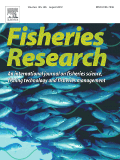
FISHERIES RESEARCH
Shaping conservation through rigorous aquatic research.Fisheries Research, published by Elsevier, is a leading international journal dedicated to the advancement and dissemination of research in the field of aquatic science. With an ISSN of 0165-7836 and E-ISSN 1872-6763, this influential journal has been pivotal in shaping fisheries management and conservation strategies since its inception in 1981. As a distinguished publication ranked in the Q1 category for Aquatic Science in 2023, it holds a prestigious position, reflected in its Scopus ranking of 73/247 in Agricultural and Biological Sciences. Fisher fisheries research encompasses a diverse array of topics such as fish population dynamics, ecosystem management, and sustainable practices, making it an essential resource for researchers, professionals, and students alike. Although it currently does not offer Open Access, the journal remains a crucial platform for disseminating high-quality research and fostering dialogue within the aquatic science community. With its address at Radarweg 29, 1043 NX Amsterdam, Netherlands, Fisheries Research continues to contribute significantly to the global discourse on fisheries science and management.
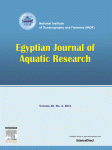
Egyptian Journal of Aquatic Research
Unveiling innovative research in water science.Welcome to the Egyptian Journal of Aquatic Research, a premier peer-reviewed academic journal published by ELSEVIER, dedicated to advancing the field of aquatic sciences. With a robust impact factor and recognition as a Q1 journal in key categories such as Aquatic Science and Ecology, this open access journal has established itself as a vital platform for disseminating high-quality research since its inception in 2012. The journal aims to provide comprehensive coverage of topics including ecology, evolutionary biology, and water science, making it a crucial resource for researchers, professionals, and students engaged in these dynamic fields. With Scopus rankings placing it in the top echelons of various categories, the Egyptian Journal of Aquatic Research fosters innovation, collaboration, and knowledge dissemination on a global scale, making it an indispensable asset for anyone invested in understanding and preserving aquatic systems.
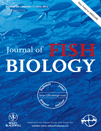
JOURNAL OF FISH BIOLOGY
Exploring the Depths of Fish BiologyJOURNAL OF FISH BIOLOGY, published by Wiley in the United Kingdom, is a distinguished peer-reviewed journal dedicated to advancing the understanding of the biology and relationships of fishes. With a robust history from its inception in 1969 to its future publications extending into 2024, the journal occupies a pivotal position in the academic landscape of aquatic sciences and ecology. Holding a notable Impact Factor and recognized within the second quartile (Q2) for both Aquatic Science and Ecology, Evolution, Behavior and Systematics, it serves as an essential resource for researchers, professionals, and students alike. The journal’s contributors delve into diverse topics ranging from evolutionary biology to conservation strategies, fostering a dynamic interchange of knowledge and innovation within the fish biology community. Access options are currently via subscription, ensuring high-quality, curated content that reflects the latest empirical research and theoretical advancements in the field.
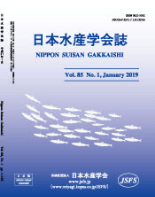
NIPPON SUISAN GAKKAISHI
Illuminating the Science of Aquatic EcosystemsNIPPON SUISAN GAKKAISHI, published by the Japanese Society of Fisheries Science, is a prestigious journal with a long history dating back to its inaugural issue in 1932. This journal, which spans key contributions to the field of Aquatic Science, serves as a vital platform for the dissemination of important research findings related to fisheries and aquatic biology, fostering knowledge and innovation in Japan and beyond. Although it is not an open-access publication, its rigorous peer-review process ensures the quality and integrity of the articles published. The journal is currently listed in the Q4 category for Aquatic Science according to the 2023 metrics, placing it within a niche but significant corner of the research landscape. With an ISSN of 0021-5392 and E-ISSN of 1349-998X, it continues to provide essential insights that benefit researchers, professionals, and students alike, highlighting advancements and challenges within aquatic ecosystems over a converged year span that continues to evolve through to 2024.
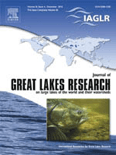
JOURNAL OF GREAT LAKES RESEARCH
Pioneering Discoveries in Aquatic SciencesJOURNAL OF GREAT LAKES RESEARCH is a prestigious academic journal published by Elsevier Science Ltd, focused on the vital field of aquatic sciences and ecology. With a long-standing history since its inception in 1975, this journal proudly ranks in the Q1 quartile across multiple categories, including Aquatic Science and Ecology, as of 2023, reflecting its significant contribution to the scientific community. The journal's impact is underscored by its impressive Scopus rankings, placing it within the top percentile of scholarly publications in related disciplines. Although it operates under a subscription model, its influence extends globally, serving as a critical resource for researchers and professionals dedicated to understanding the Great Lakes ecosystem and its broader ecological implications. As it converges into its future publications through 2024, JOURNAL OF GREAT LAKES RESEARCH remains an essential platform for innovative research that shapes environmental policy and promotes sustainable practices in aquatic environments.
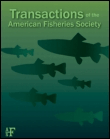
TRANSACTIONS OF THE AMERICAN FISHERIES SOCIETY
Elevating the discourse in aquatic science and ecology.TRANSACTIONS OF THE AMERICAN FISHERIES SOCIETY, published by Wiley, is a leading journal dedicated to the field of fisheries science and aquatic ecology, with a rich history dating back to its inception in 1872. As an esteemed publication within the realms of Aquatic Science and Ecology, Evolution, Behavior, and Systematics, it currently holds a Q2 quartile ranking, demonstrating its significance and influence in these disciplines. The journal is not open access, which enables a curated peer-review process while ensuring high-quality research dissemination. The journal serves as a vital platform for scholars and practitioners alike, providing essential insights into the management and conservation of aquatic resources. Its commitment to addressing contemporary challenges faced in fisheries and aquatic environments makes it indispensable for researchers, professionals, and students seeking to contribute to this dynamic field.